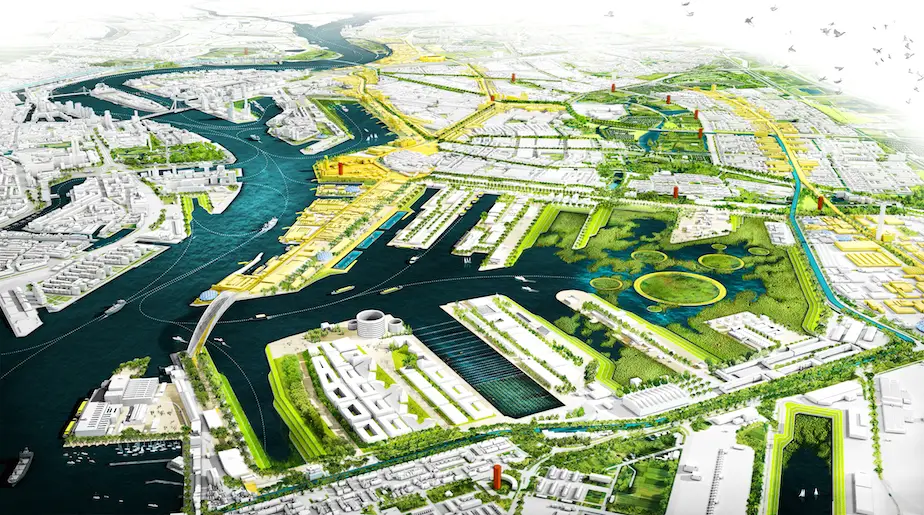I asked myself the question: so what struck me about the process of thinking across boundaries and reimagining planning in the issues that we have been discussing in our celebration of DPU’s 60th anniversary in this conference. At the risk of simplifying a complex and dynamic set of discussions, I want to make six points.
Reimagining planning is clearly a normative process
The question of whose values, and whose vision we’re dealing with is absolutely crucial. Sue Parnell, of University of Cape Town, highlighted the normative character of our challenge in the first session. Also Aromar Revi, from the Indian Institute of Human Settlements (IIHS), raised the question in the first session of the importance of history: ‘Do not erase our history!’ I think that is really important, but it also poses us an enormous dilemma, because history and culture, as we know, and as we’ve started to discuss more today, always has embedded within it enormous inequalities in power relations.
I think that the ‘right to change the city’ as Gautam Bhan from IIHS – with history in mind, with culture in mind – but the right to change the city so that it reflects the kind of society that we want to live in, is a very important element of that. And how we do that, and how we reimagine planning in a transformative way is one of the biggest challenges that we are going to face.
Sheela Patel, of SPARC and SDI, reminded us in no uncertain terms, and I quote her: ‘All professionals need to take informality and creation of inclusion as urgent business – or lose credibility with the majority of city-dwellers.’ It couldn’t be said more clearly. That’s a wake-up call for professionals. Democracy matters in all of this – this is a political position.
Reimagining planning is going to require a fundamental reframing of our understanding of cities and planning.
Quite honestly, it hard not to be overwhelmed by the range of challenges which my colleagues have outlined so clearly in the conference. These challenges are so enormous and yet we need to find a way of coming to terms with them and working with them and reframing our understanding of these processes and practices. We talked a lot ‘about making the invisible visible’, particularly around informality. We talked about the need to address the ‘deep political economy’, and today we got very strong messages about the importance of incorporating a transversal and cross-cutting issues like environment and intersectional social relations in our understanding of the deep political economy.
Although we talk about planning and practice, theory matters. It’s not just any theory we’re looking for – its actionable theory. We’ve talked a lot about fundamental paradigm shifts in the conference. Those are enormous boundaries to cross. Yet it is the paradigm shift that we need in order to confront that transformative agenda – the normative agendas that we have all been talking about.
Reimagining planning is going to be a negotiated process, which involves dialogue and advocacy.
Yes, we need to talk to each other, to build a common platform. Professor Kombe, of Ardhi University in Taznaia, said a phrase that struck me very strongly: ‘solutions do not lie in planning per se, but in a dialogue between the State and others.’
But it also involves advocacy. We need to go beyond discourses. The new reimagining of planning requires advocacy to put across new ideas, a reframing of what the challenge is. The conference reflected that colleagues and peers are doing precisely this – playing a leadership role in our field, promoting new ideas, lobbying, talking to key people, trying to change the way governments are thinking about urbanization, urbanism and planning. In this sense, this negotiated process is going to require not only dialogue but also strong advocacy and leadership to make it work.
Reimagining planning is going to require an engagement with institutional and organisational development.
I think that the basic question here is that posed by Mark Swilling of the University of Stellenbosch: ‘who is going to determine our futures?’ Institutionally this is a governance question, it is a political question. Over the last few days we have discussed the problems over the legitimacy of our institutions, particularly our State institutions. Somsook Boonyabancha, from ACHR & CODI, has also warned us that the gap between people and institutions is widening. So it seems to me that we are in a very delicate moment here around the legitimacy of State institutions.
Again and again we are also talking about the role of the private sector in urban development, and how in many instances the rules of engagement between the state and the private sector appear to have collapsed. In addition, Antonio Estache of Université Libre de Bruxelles and DPU, UCL, presented the limited capacity of public-private partnerships to meet future urban challenges. Yesterday we also talked about international aid and the limits to addressing urban challenges without partnerships with local governments and communities.
The final issue I want to pick up under institutions and organisation is the question of regulation. As our colleagues working in Africa have pointed out we are dealing with out-dated and inappropriate frameworks for planning. However, we are not talking about more regulations, but rather ‘regulation to protect rights, equality and justice.’ That is what we are looking for: that is not more regulation, it is about more quality.
Innovative and participative strategy development and implementation can generate a reimagined planning vision and process
If we’re talking about planning, we also have to be talking about practice – about action. How do we deal with the gap between radical thinking and collective action? Something we need to bring back into focus is the redistributive character of planning. People talked about the processes of capturing value, which I think is very important, and there are some very interesting examples in different parts of the world that we could learn a lot from. What is obvious is that all these strategies are contingent on time and place.
I think that in our field there are a number of international opportunities where we can participate in our field to raise the urban profile – such as the post 2015 SDG process and I think that there’s possibly something quite interesting coming out of that international process. I hope that we can also make the Habitat III process work. Because these international opportunities are few and far between, we need to make the most of them in order to push the agendas that we know are important urban development and planning. Finally, whatever we say about strategies, the one thing I think we’ve all agreed on is that politics always matters.
Reimagining planning is going to require a continuous learning process
I suppose one of the most dramatic challenges we had put to us was the exhortation to ‘unlearn’. We need to confront the importance to unlearn because we’ve learned so much professional ‘stuff’ that is not useful and that guides us in all sorts of directions that are not useful in taking on the task of reimagining of planning.
During the conference and particularly in the last session, we have talked about what is being learned, we have talked about where it is being learned, we have talked about how it is being learned. I was struck by the challenge that Sheela Patel (of SPARC & SDI) made that in Mumbai and in Nairobi, there had been long negotiated experiences of moving railway slum dwellers in the face of investment to upgrade railways developments. Kenya had learned from the Indian experience of doing this and yet other similar projects are going on in other parts of the world as if no learning had happened, as if it was the first time this was being done. Clearly we have got to get better at learning across our different experiences.
In conclusion
Over the last 60 years, of course the world has changed, it is a much more complicated place and it is fast-moving, but there are some threads that run through this history. What was confirmed to me over this conference is that we are a community of practice. We know that intellectually because we know we share a range of common values about how we approach planning and cities, and how we educate the next generation of urban practitioners. And I do hope that we can build on this community of practice in the next decade together in what I think will be an extremely exciting agenda of thinking across boundaries and reimagining planning.


